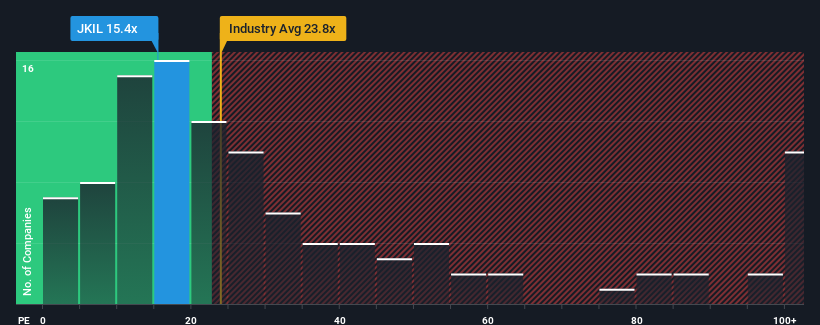- India
- /
- Construction
- /
- NSEI:JKIL
Improved Earnings Required Before J. Kumar Infraprojects Limited (NSE:JKIL) Stock's 43% Jump Looks Justified
J. Kumar Infraprojects Limited (NSE:JKIL) shareholders have had their patience rewarded with a 43% share price jump in the last month. The last month tops off a massive increase of 118% in the last year.
In spite of the firm bounce in price, J. Kumar Infraprojects' price-to-earnings (or "P/E") ratio of 15.4x might still make it look like a buy right now compared to the market in India, where around half of the companies have P/E ratios above 30x and even P/E's above 55x are quite common. Nonetheless, we'd need to dig a little deeper to determine if there is a rational basis for the reduced P/E.
Recent times haven't been advantageous for J. Kumar Infraprojects as its earnings have been rising slower than most other companies. The P/E is probably low because investors think this lacklustre earnings performance isn't going to get any better. If this is the case, then existing shareholders will probably struggle to get excited about the future direction of the share price.
View our latest analysis for J. Kumar Infraprojects

Does Growth Match The Low P/E?
J. Kumar Infraprojects' P/E ratio would be typical for a company that's only expected to deliver limited growth, and importantly, perform worse than the market.
Retrospectively, the last year delivered a decent 11% gain to the company's bottom line. Pleasingly, EPS has also lifted 299% in aggregate from three years ago, partly thanks to the last 12 months of growth. Accordingly, shareholders would have probably welcomed those medium-term rates of earnings growth.
Shifting to the future, estimates from the four analysts covering the company suggest earnings should grow by 14% per annum over the next three years. With the market predicted to deliver 19% growth each year, the company is positioned for a weaker earnings result.
In light of this, it's understandable that J. Kumar Infraprojects' P/E sits below the majority of other companies. Apparently many shareholders weren't comfortable holding on while the company is potentially eyeing a less prosperous future.
What We Can Learn From J. Kumar Infraprojects' P/E?
The latest share price surge wasn't enough to lift J. Kumar Infraprojects' P/E close to the market median. It's argued the price-to-earnings ratio is an inferior measure of value within certain industries, but it can be a powerful business sentiment indicator.
We've established that J. Kumar Infraprojects maintains its low P/E on the weakness of its forecast growth being lower than the wider market, as expected. Right now shareholders are accepting the low P/E as they concede future earnings probably won't provide any pleasant surprises. It's hard to see the share price rising strongly in the near future under these circumstances.
You should always think about risks. Case in point, we've spotted 2 warning signs for J. Kumar Infraprojects you should be aware of.
If these risks are making you reconsider your opinion on J. Kumar Infraprojects, explore our interactive list of high quality stocks to get an idea of what else is out there.
New: Manage All Your Stock Portfolios in One Place
We've created the ultimate portfolio companion for stock investors, and it's free.
• Connect an unlimited number of Portfolios and see your total in one currency
• Be alerted to new Warning Signs or Risks via email or mobile
• Track the Fair Value of your stocks
Have feedback on this article? Concerned about the content? Get in touch with us directly. Alternatively, email editorial-team (at) simplywallst.com.
This article by Simply Wall St is general in nature. We provide commentary based on historical data and analyst forecasts only using an unbiased methodology and our articles are not intended to be financial advice. It does not constitute a recommendation to buy or sell any stock, and does not take account of your objectives, or your financial situation. We aim to bring you long-term focused analysis driven by fundamental data. Note that our analysis may not factor in the latest price-sensitive company announcements or qualitative material. Simply Wall St has no position in any stocks mentioned.
About NSEI:JKIL
Flawless balance sheet, good value and pays a dividend.
Similar Companies
Market Insights
Weekly Picks

Solutions by stc: 34% Upside in Saudi's Digital Transformation Leader


The AI Infrastructure Giant Grows Into Its Valuation
Recently Updated Narratives
Many trends acting at the same time


Engineered for Stability. Positioned for Growth.


Staggered by dilution; positions for growth
Popular Narratives


MicroVision will explode future revenue by 380.37% with a vision towards success


NVDA: Expanding AI Demand Will Drive Major Data Center Investments Through 2026



